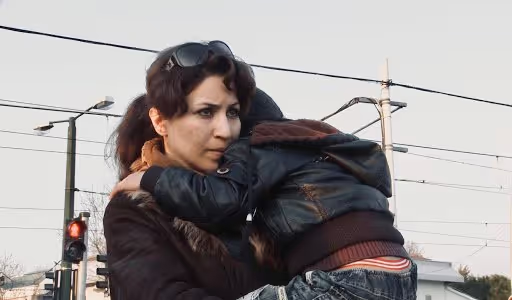Love Child Discussion Guide Discussion Questions: After Viewing 'Love Child'
Discussion Questions: After Viewing 'Love Child'

Immediately after the film, you may want to give people a few quiet moments to reflect on what they have seen. You could pose a general question (examples below) and give people some time to themselves to jot down their thoughts, share their reflections with a partner, or to think about their ideas before opening the floor for discussion.
DISCUSSION QUESTIONS: STARTING THE CONVERSATION
Immediately after the film, you may want to give people a few quiet moments to reflect on what they have seen or pose a general question (examples below) and give people some time to jot down or think about their answers before opening the discussion:
- If you were going to tell a friend about this film, what would you say?
- Describe a moment or scene in the film that you found particularly striking or moving. What was it about that scene that was especially compelling for you?
- If you could ask anyone in the film a single question, whom would you ask and what would you want to know more about?
- Did anything in the film surprise you?
- What aspects of the film (landscape, language, feelings, family dynamics, etc.) were relatable? If so, what felt familiar? If not, what felt new and unfamiliar?
PROMPT ONE: Seeking Asylum: Necessity, Journey, and Life in-between
- In Love Child we get a window into the lives of asylum seekers - rights, safety and desire for seemingly basic rights.
- In what ways does this film challenge how you thought about freedom?
- In what ways does this film complicate how you thought about safety?
- How does the film nuance, and raise the importance, of acceptance of rejection in terms of the asylum application process?
- This film raises questions about safety. Internationally, safety seems to be a word and concept that has varying definitions depending on an individual’s proximity to power and privilege. After viewing this film, do you think of safety as a privilege or right? What shaped your thoughts, or forced you to reconsider what you thought about safety before viewing? In what other ways can safety be a political, social, or cultural issue?
- How doesLove Child explore the tensions that exist between being hopeful and standing in the face of constant obstacles and adversity and uncertainty?
- What does it mean to live a life in limbo and build tolerance for uncertainty?
- How can joy be discovered amidst struggle? What examples do you see in the film?
PROMPT TWO: Politics of Belonging: Country, Home, and Happiness
- How does Love Child explore the dynamics of what it means to live a life where you do not feel seen or valued?
- How have you seen these tensions and dynamics in historical and contemporary social movements, events and struggles for change (i.e. gay rights, civil rights, women’s rights)?
- How do Leila, Sahand and Mani’s desire for a better, safer life clash with and exacerbate the complexities of belonging/not belonging?
- After watching the film, do you believe that a sense of belonging can be political? What are some factors that make belonging a political fight? Why is it political?
- In what ways can belonging be a cultural or social issue?
- What does this film teach you about reconsidering ideas of “home” and the necessity for belonging?
PROMPT THREE: Documenting Humanity: Citizenship and Struggle
- What questions about human rights emerge for you after watching Love Child?
- What examples do we see about the way countries and their rules place different values on life, liberty, and happiness?
- What systems contribute to shaping how a country conceives of rights? What are some examples of systems that define, or place value on, life, liberty, and happiness that are still present?
- In what ways does Love Child exhibit some of the harm that documentation and having to prove your experiences of survival, your family, and your love as “legitimate” can cause?
- After viewing this film, do you think there are ways the asylum process can be dehumanizing, despite its aims at providing protection for humans?
- Towards the end of the film, Sahand says, “People who want a better life have to go through hard times and this is our hard time.” What is inspiring about Leila and Sahand’s journey and persistence?
- In what ways does this film open up questions, curiosities and thoughts about the lives of asylum seekers and refugees? What are some new questions you have after viewing this film?
- How have you observed, or been exposed to, anti-Muslim bigotry in the United States?
- What are some actions you and your community can take to support people who are threatened by bigotry and hate?
- Are there ways you can intervene in moments if you witness someone being harmed by anti-Muslim bigotry?
PROMPT FOUR: THE BOUNDARIES OF LOVE AND HAPPINESS
- What are the physical and emotional consequences that we see play out for this family when they choose to chase what they know they deserve and what will make them happy?
- Have you experienced situations and life choices where you took great leaps and risks? What emotions did you experience? What supports were in place that helped?
- How does the film situate the complex dynamics of family life and families that are not considered “traditional?”
- Considering Mani’s journey and the ways he was impacted through this experience, how do you think a child’s perspective might be shaped by political transitions?
- What role do you think therapy played in supporting the family, Mani included, through this journey? In this way, do you think having a therapy relationship to process very difficult life experiences is useful? How might therapy help? How has therapy helped in your life?
- What does this film teach us about celebrating small joys?

